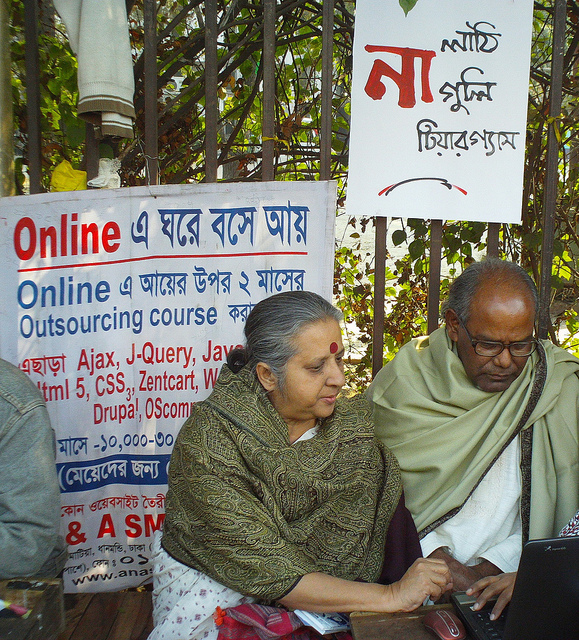Photo: persecutionbd
This past week, a proponent of religious and ethnic tolerance came to University of Texas Law School to discuss religiously motivated violence in Bangladesh. The Law School’s Rapoport Center hosted the talk by Khushi Kabir (pictured above), activist and public face of Nijera Kori, a Bangladeshi NGO that educates and mobilizes the rural poor to advocate for their own land and political rights.
Kabir sat proudly at the head of a long table, in a little white-walled classroom just off an echo-filled hall, on the fifth floor of the law school. The room was cramped—all the chairs around the table were filled when I arrived, and the Rapaport Center’s busy staff were ferrying chairs from some mysterious location and lining them up along the walls like bright red dominos. Attendees were a mix of undergraduate and graduate students and professors from various departments, including the law school, the LBJ school, and the government department.
As I situated myself, I studied Kabir’s face. It was unmade-up, wide and fleshy and unfussy, with a strong, pert mouth and eyes that projected calm and skepticism all at once. Her square body was swathed in some kind of traditional Bangla wrap, with golden threads sewn into the lavender fabric, reflecting and softening the harsh fluorescent lighting of the room.
“I grew up in the 1960s,” she began. And she described a time when young people were inspired and hopeful about the future. “We believed in change,” she explained, “We believed it could actually happen.”
But from hopeful beginnings, Kabir’s story grew dark. The war for independence in 1971, which Kabir and her peers believed they had fought in the name of secular values, did bring about a free and sovereign state. But in the aftermath there was much to atone for: genocide, widespread displacement of civilians – largely Hindus– and various other war crimes.
In more recent years, Bangladesh’s government has turned a blind eye to religiously-motivated violence, calling attack after attack on bloggers by machete-wielding Wahabi Muslim extremists merely “isolated incidents.” More than 20 people have been killed by Islamist militants since 2013. Among the victims have been many bloggers, secularists, and religious minorities, as well as two foreigners. In most cases a single attacker wields a machete and hacks his victim to death. For a time, one member of the audience said during the talk, the Islamist radicals openly advocated killing at least one victim per month.
Because the new generation has failed to articulate a coherent ideological vision, a darker, bloodier ideology has slunk in to fill the space.
There are only two explanations, said Kabir, for the government’s willful blindness toward what is quite obviously a pattern of violence. One, the government is actively pandering to radical fringe groups because it relies on them to stay in power. Two, the government shies away from discussing religion because it fears undermining its own legitimacy. Is that legitimacy based on Islam? It shouldn’t be. One of the four fundamental principles at the heart of the country’s 1972 Constitution is secularism: in this historically diverse country, citizens’ rights come from their status as citizens, not from their embrace of any particular creed.
Yet unofficially, says Kabir, non-Muslims are feeling less and less at home in Bangladesh. In 1972, just after the war, the Hindu minority hovered around 13 percent. That number is now closer to 8 percent. And whenever another blogger or professor is slaughtered in a religiously motivated attack, the victim’s relatives are quick to insist that the dead man or woman was a faithful Muslim, not an atheist.
“Why is this kind of justification necessary?” Kabir asked in exasperation. It’s quite telling, she explained, that in the face of a bloody murder, her country is not asking how it can punish the offenders but rather whether or not the victim was religious. Whether or not the victim “deserved” to be killed.
The story that Kabir tells about her country is a sobering one. But, she reminded her listeners gravely, it is not one unique to Bangladesh. In countries all over the world, there are people wielding religions — even religions we believed to be “full of peace,” as she put it – to beat down those who cannot in good conscience adhere to the same tenets of faith.
This rampant intolerance is the product, Kabir says, of a vacuum: because the new generation has failed to articulate a coherent ideological vision, a darker, bloodier ideology has slunk in to fill the space. It has taken up residence in the country that Kabir calls home, but it also lives in mosques, churches and temples in London, Paris and New York. In the minds of people everywhere who would sacrifice the rights of their fellow citizens on an altar to a specific creed.
There are signs of progress, of course. Kabir’s organization is busy educating and empowering Bangladesh’s rural poor. Meanwhile, a controversial criminal tribunal is holding people accountable for crimes committed during the country’s war for independence, nearly 45 years ago. Atoning for the violence and errors of the past will always be politically unpopular, but it is deeply necessary if any country – not just Bangladesh – seeks to move forward. Perhaps with some humility, and with a renewed enthusiasm for diversity and tolerance, Bangladesh will find a way to heal and thrive. May the rest of the world follow suit.
Edited by: Elizabeth Petruy

